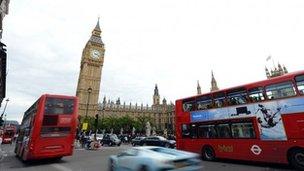Pay bill for government special advisers up 25%
- Published

The coalition has increased the number of special advisers working in Whitehall
The pay bill for special advisers to the coalition government has increased by about 25% in its second year.
Prime Minister David Cameron told MPs that the pay bill for the year to 31 March 2012 was £6.2m, compared with £4.5m for the 11 months to March 2011.
The three highest paid advisers remain Craig Oliver, Andrew Cooper and Edward Llewellyn, who all work in Number 10.
But the government spokesman said the total number of special advisers was "very low".
<link> <caption>In his written statement</caption> <url href="http://www.parliament.uk/documents/commons-vote-office/July_2012/17-07-12/23-PM-SpecialAdvisers.pdf" platform="highweb"/> </link> Mr Cameron noted that the pay bill for the most recent year was still lower than the £6.8m spent in the final year of the last Labour government.
Special advisers are employed as temporary government workers but do not have to be politically impartial like their civil service colleagues.
'Misleading'
They link together the minister, the party and the department and can handle a range of functions such as writing speeches, devising policies or dealing with the media.
The number of coalition special advisers has increased from 65 to 79, as ministers have sought to exert more control over the machinery of government and deliver policy goals.
Deputy Prime Minister Nick Clegg has increased his special advisers from five to 14 to cover work in a variety of departments.
Ahead of the last general election both the Conservative and Lib Dem leaders had called for a cut in the numbers of special advisers and the coalition agreement said there would be a "limit" on their number, which had reached 78 before the last election.
The number of special advisers reached a high point of 84 when Tony Blair was Prime Minister in 2004/5.
A Cabinet Office spokesman said: "It is misleading to compare current costs with 2010/11, as a number of advisers were only in place for part of that year, reducing the overall pay bill costs.
"Despite the unusual circumstances of a coalition, the full-year costs of special advisers for 2011/12 is £6.2m - down from £6.8m in the last full year of the previous government.
"The number of special advisers as a proportion of the senior civil service is, and will continue to be, very low."